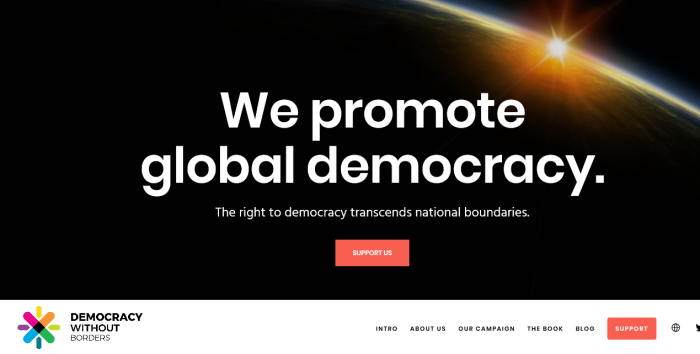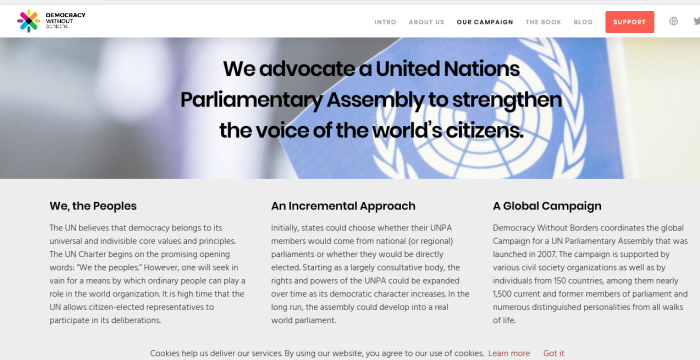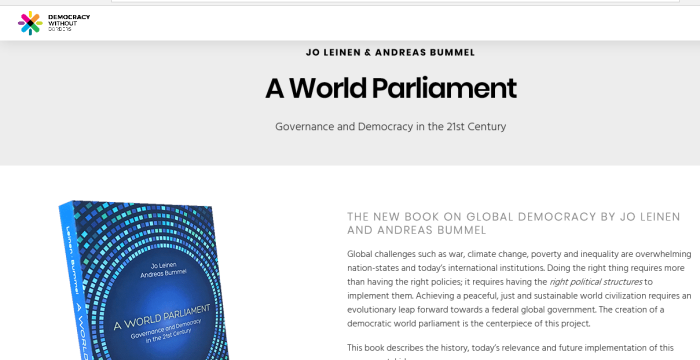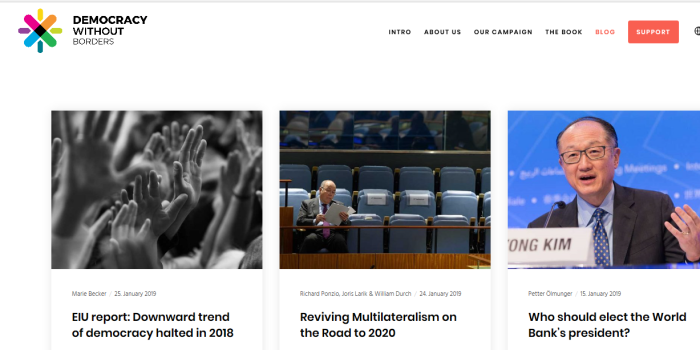



(Open call for 1-world government)
“We strive for a democratic world order in which citizens participate beyond national boundaries.”
At least they are being upfront about it.
CLICK HERE, for the main site
Let read some more about what this organization wants to do
We, the Peoples
The UN believes that democracy belongs to its universal and indivisible core values and principles. The UN Charter begins on the promising opening words: “We the peoples.” However, one will seek in vain for a means by which ordinary people can play a role in the world organization. It is high time that the UN allows citizen-elected representatives to participate in its deliberations.An Incremental Approach
Initially, states could choose whether their UNPA members would come from national (or regional) parliaments or whether they would be directly elected. Starting as a largely consultative body, the rights and powers of the UNPA could be expanded over time as its democratic character increases. In the long run, the assembly could develop into a real world parliament.A Global Campaign
Democracy Without Borders coordinates the global Campaign for a UN Parliamentary Assembly that was launched in 2007. The campaign is supported by various civil society organizations as well as by individuals from 150 countries, among them nearly 1,500 current and former members of parliament and numerous distinguished personalities from all walks of life.
The UN believes that democracy belongs to universal values & principles
CLICK HERE, for a review of “The New Nationalism”, by Steve Turley. He makes a very compelling argument for what really binds societies together.
ETHNO-NATIONALIST: The people are what matters, be it: heritage, culture, common language, traditions, way of life, and often ancestry, are the necessary elements for a cohesive society. EN is commonly thought to be a racial supremacist ideology, but that just isn’t the case.
CIVIC-NATIONALIST: The multicultural way of life. The cohesive unity that ethno-nationalists stress is not nearly as important as more abstract beliefs such as freedom of speech, freedom of religion, freedom of association, and acceptance rather than assimilation of newcomers.
Civic nationalists claim (rightly), that their society promotes tolerance and diversity. Ethno nationalists claim (rightly), that there is nothing that holds them together, and that people will just form groups which do reflect their identities. These 2 ideologies are in fact arguing different things.
It becomes clear that this group promotes the idea of “values” rather than “identity”. But what values exactly? And if a “culture” or “religion” has values which are completely incompatible, do we just accept it as “diversity?
It is time the UN allows citizen-elected representatives to take part in the deliberations? Why is that? What is wrong with keeping democratic voices within the nations themselves? Of course, if 51% of nations decide to impose rules that the other 49% vehemently oppose, that would technically be “democratic”.
This was launched in 2007, more than a decade ago? Then why has there been no public debate on the issue?
“As humanity struggles with mass violence, mass migrations and the widening effect of climate change, the international system inaugurated nearly 75 years ago to manage such global problems seems to be crumbling. The United States has turned its back on the United Nations Human Rights Council and the Paris climate accord. It openly attacked the International Criminal Court. During the UN General Assembly, Donald Trump publicly stated that “nations must defend against threats to sovereignty … from global governance.”
The UN Human Rights Council, as of the time of this publishing, includes:
1/ Afghanistan;
2/ Bahrain;
3/ Bangladesh;
4/ China;
5/ Cuba;
6/ Democratic Republic of the Congo;
7/ India;
8/ Iraq;
9/ Nigeria;
10/ Pakistan;
11/ Qatar;
12/ Rwanda;
13/ Saudi Arabia;
14/ Somalia;
15/ Tunisia
So why exactly should the US take this “Human Rights Council” seriously?
The “climate change scam” does nothing to prevent climate change. It is just a giant wealth transfer scheme. No wonder Trump left.
As for the UN Global Migration Compact, it is a globalist agreement to normalize mass migration. In fact, the UN cites 258 million migrants. Not refugees. Migrants.
“Fortunately, efforts by others to reinvigorate the multilateral system are underway. Last November, President Emmanuel Macron convened the inaugural Paris Peace Forum, to “offer the opportunity to reflect on world governance while we commemorate the end of World War I and recognize our collective responsibility.”
Poor example to cite Macron. Efforts may be underway, but there is at least as much pushback. Nationalists won’t tolerate the one-world vision Macron promotes. Nor is the European Army idea going over too well.
“Call for a global leaders summit in 2020
Among the initiatives gathered in Paris was Just Security 2020, which builds on the Albright-Gambari Commission on Global Security, Justice and Governance and calls for a global leaders summit in September 2020, the 75th anniversary of the UN’s founding.
The suggested summit offers a chance to contemplate the international system as a whole and its anchor, the UN. This gathering could adopt innovations to make the UN better prepared for current and future global challenges and more resilient amid America’s withdrawal from global leadership.”
Cute to use the 75th anniversary of UN founding. But that is the least of it.
Logistical question: given the money that the United States has been pumping in for the last 75 years, approximately 25% of all payments globally that leaves a major gap. Furthermore, you seem to assume that no other nations will leave. Very unwise.
“For the summit to achieve meaningful changes, a new coalition of smart like-minded civil society groups and states is urgently needed. The UN 2020 Initiative has built a broad effort advocating for such a leaders summit. Through consultations, policy research and engaging government delegations, the coalition represents what is needed to ensure that UN reforms meet 21st-century challenges.”
Like minded in what way? You need to specify. Will leader with nationalist views be shunned?
Despite the initiative’s growing influence, in September last year, Russia and the Non-Aligned Movement (NAM) succeeded in removing from a new UN General Assembly Resolution, A/RES/72/313, language seeking preparations for the 75th anniversary with an eye to “further strengthen the Organization and improve its work.” Russia and NAM countries, such as Algeria, appear already concerned about a summit agenda that could run counter to their national interests.”
Now we get to some good stuff, though it seems shrugged off. Several other nations are worried about a summit that runs counter to their national interests. The US may be the least of your worries.
“Rebuilding multilateralism
Rather than resign themselves to these near-term diplomatic setbacks, concerned civic groups and governments should be inspired by President Macron’s recent call, in his address to the General Assembly, to “rebuild multilateralism,” which he sees as a “challenge . . . for our generation.” In addition, German foreign minister Heiko Maas proclaimed that the United Nations thrives on the pledge of “Together First”, a slogan which is now the name of a civil society campaign launched at the Paris Peace Forum.
Further, the Spanish foreign minister Josep Borrell stated in an op-ed that the 75th anniversary of the United Nations in 2020 “may be a good moment to analyse at a summit some institutional changes necessary to increase its legitimacy and effectiveness, such as the reform of the Security Council to make it more representative and limit the use of the vetoes of the great powers, or the establishment of a parliamentary assembly, thus strengthening the role of civil society and the democratic dimension of the multilateral system.”
What Are the Goals for 2020?
To reverse the recent inroads made by populist and authoritarian forces worldwide, it is time for governments, scholars, activists and others to reiterate the need for multilateralism and to recognize the pursuit of justice and security as critical for achieving peace and prosperity. This approach is spelled out in our new book, Just Security in an Undergoverned World.”
This is Orwellian style double speak. Populists who listen to their people have made inroads, and this is a bad thing? What happened to being accountable to your citizens?
The pursuit of justice and security as critical? Sounds like a totalitarian state. Or rather, post-national state.
And to be clear: are populists and authoritarians 2 different things? Or do you conflate them?
“In examining threats and opportunities at the intersection of security and justice through the prism of “just security,” we developed these proposals:
I’m almost afraid to read further.
“Make key changes in UN Security Council membership and engagement. The UN’s approaching anniversary should encourage give and take, which could break the political logjam that has long hampered efforts to make the Council more effective and representative. For example, a small amendment to the UN Charter’s Article 23 could allow nonpermanent members (e.g., Germany and India) to be re-elected for consecutive terms. And the Council’s permanent-five members (Britain, China, France, Russia and the US) should again be encouraged to restrain — or at least to publicly justify — their use of the veto in cases of mass atrocities against civilians.”
Break the political logjam? Okay, this seems more like tweaking a system.
Britain, France, China, US & Russia should be encouraged to refrain (or at least justify) using their veto in cases of mass civilian atrocities? With this statement, you have basically justified “scrapping” the entire UN Security Council.
“Create a “G20+” as part of a new framework for global economic cooperation. Every two years at UN headquarters, the G20 forum should engage the other 173 member countries of the world body to ensure greater institutionalized coordination — with the World Bank, International Monetary Fund, World Trade Organization and others — and more prioritizing on crucial issues for the world economy. This new G20+ configuration could also strive to prevent the spread of cross-border financial shocks, promote the reduction of economic inequality and foster the inclusive growth that is necessary for achieving the Sustainable Development Goals by 2030.”
Integrating nations with globalist organizations? Integrating nations into one umbrella organization? How is that working out for the European Union?
“Establish a UN parliamentary network as an advisory body under UN Charter Article 22. The network would engage parliamentarians from their own legislatures to advise the General Assembly on UN governance, from reducing extreme poverty to nuclear nonproliferation. It would also complement other work to develop a transnational democratic culture, including the European Parliament’s recent recommendation to establish a UN parliamentary assembly.”
The European Union supports a proposed UN Parliament? That I believe. And yes, efforts are underway to launch such a project. Although, with the vast amount of difficulty the EU is having, why would a UN Parliament fare any better? European nations at least have similar cultures and heritages, something that obviously wouldn’t hold for a “global” parliament.
“A New ‘Smart’ Coalition
At the start of his tenure, in January 2017, UN Secretary-General António Guterres launched internal reviews on peace and security, development and management sectors, and in late July he appointed Jens Wandel, a veteran UN administrator, to carry out the reforms. While the reviews recommended long-overdue changes to the UN system, they are only the first wave of transformations to come.
A new kind of smart coalition that taps the ideas, networks and abilities of diverse players must step up, alongside Guterres, to ensure that the UN’s 75th anniversary commemoration in two years becomes a turning point and not an anticlimax. Constructive criticisms of the UN from the right and the left should be heeded to weigh and adopt bold structural reform ideas. All this can help enable a modernized system of governance to better grapple with the crises now facing humankind.
This piece was originally published at Passblue under a CC BY-ND 4.0 license. This version includes a few updates made by the authors.”
So, is this the group behind the United Nations Parliament? They certainly support it.
Groups like this need to be exposed, if nations are to be kept intact.
Nationalists: Put “their” nation’s well being first
Globalists: Sacrifice their nation for some “greater good”
Seems simple enough, but this group will never entertain, let alone accept the nation-state.
